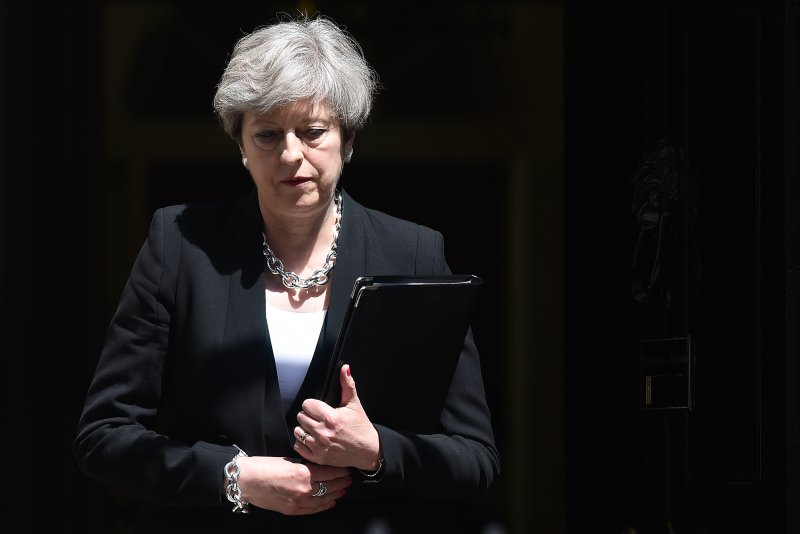British Prime Minister Theresa May hails Parliament for passing a bill that offers clarity for the Brexit strategy. A U.N. special envoy warns Brexit pulls her country away from tough EU standards on pollution. Photo by Andy Rain/EPA
Sept. 14 (UPI) -- The British government risks sliding backward on air quality to the detriment of human health through plans to leave the EU, a special U.N. envoy said.
British Prime Minister Theresa May said Tuesday that Parliament made the "historic decision" to vote for a bill that gives clarity for the path out of the European Union. Separate from the Article 50 process that breaks the formal relationship with the EU, the bill removes a measure that gave EU law supremacy, but includes provisions that provide ministers with ways to address problems that would arise after the so-called Brexit takes effect.
Buskut Tuncak, a U.N. special envoy on hazardous substances, told the U.N. Human Rights Council that London risks stepping away from some of the highest environmental standards in the world as it leaves the EU.
"Should the government fail to equal the EU on air quality controls, chemical restrictions or product manufacturing standards, the British market could risk becoming a haven for 'dirty' industries and a dumping ground for products failing to meet EU regulations," he said in a statement.
When it leaves, Tuncak, appointed in 2014, said the British government needs to adopt its own measures on emissions and air quality because what it has on the books now isn't doing enough to protect the most vulnerable members of the population from risk. As a member of the EU, he added, the country had significantly lowered emissions of sulfur dioxide, a precursor to acid rain, after it was previously the highest emitter in the bloc.
On the energy front, shippers have moved to liquefied natural gas as a marine fuel to address European and Asian concerns about sulfur dioxide emissions from conventional marine fuels. Elsewhere, government data show road traffic, measured by miles traveled, was up 1.4 percent last year and the transportation sector is typically categorized as the sector with the largest emissions. In July, however, the British government unveiled plans to ban all new gasoline- and diesel-powered vehicles from its roads beginning in 2040.
For power on the British grid, data show the share of electricity generated by renewable resources was 26.6 percent in the first quarter, up 1 percent from the same period last year.
EU measures obligate member states to reach certain benchmarks for pollution and renewable energy by 2030. In the annual State of the Union address, delivered Wednesday, EU President Jean-Claude Junker said it be Europe that will "we make our planet great again."















